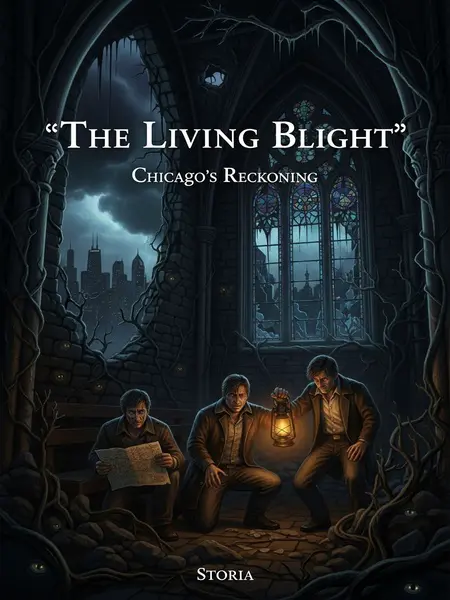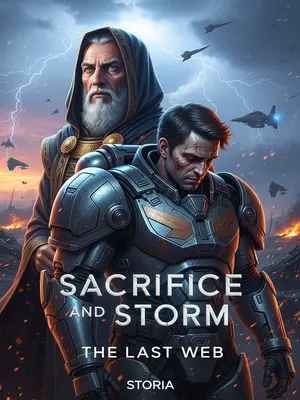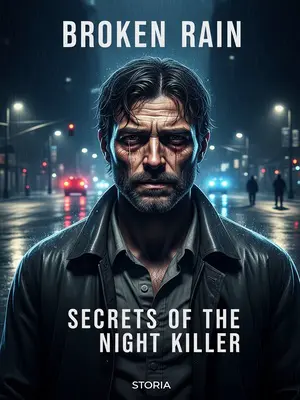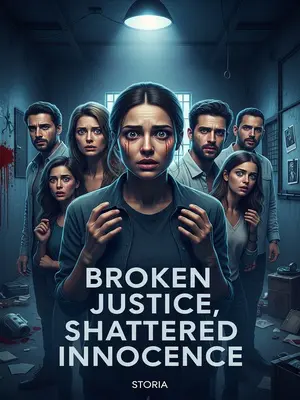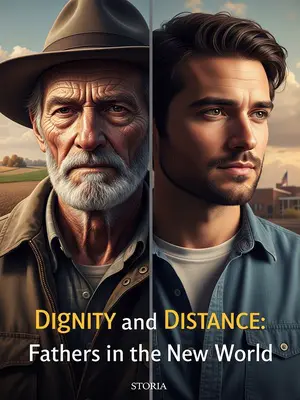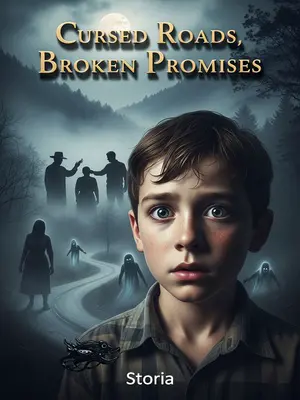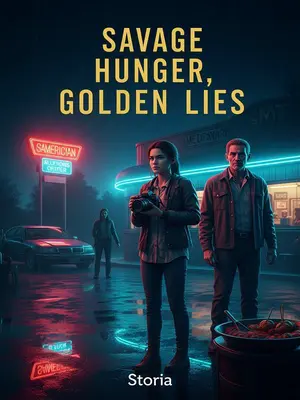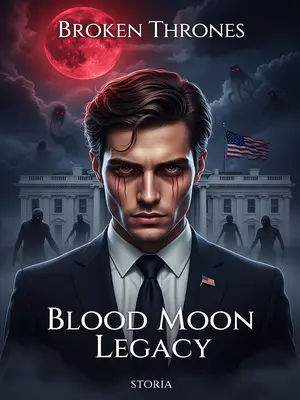Chapter 1: Refuge in the Ruined Chapel
This is the old Plague Chapel, perched on the edge of Maple Heights, Illinois—where the cornfields meet the prairie and the night air carries the scent of tilled earth and distant woodsmoke.
The chapel squatted on a small rise, its sagging roof outlined against the flat, endless sky. Shattered stained-glass windows gaped like broken teeth, and weeds—tall as a man’s knee—choked the gravel path from the cracked blacktop. The air was thick with the musty tang of mold and ancient stone, and the world outside was muffled by the heavy blanket of a prairie night. Somewhere out in the darkness, a coyote let out a sharp yip, and the faint rumble of a freight train drifted across the fields. But inside, all was still except for the snap and pop of firewood.
Beneath the crumbling nave, in the flickering shadow of a headless statue, three men huddled around a makeshift fire.
They sat so close their shoulders nearly touched, breath fogging in the sharp chill that crept through the cracked walls. The statue loomed behind, its missing head giving the place an eerie, unfinished feel. Firelight played across their faces, carving deep hollows and throwing their features into stark relief.
"You hear the rebels are almost at Silver Pass?" asked a man in a battered Cubs cap, the brim yanked low.
He fiddled with the frayed edge of the cap, rolling the bill between his fingers—a nervous tic. The faded Cubs logo was nearly worn away, but the cap was a talisman, the kind you kept for luck or in memory of sunlit afternoons at Wrigley Field. He glanced at his companions, eyes searching.
"Yeah, probably just two days out from Chicago. Man, this city’s gonna fall sooner or later. Everything’s going to hell—worse than it was two years back," replied a broad-shouldered man, poking at the fire with a stick as he talked.
He jabbed at a half-burnt log, sending up a spray of sparks. His words were heavy, edged with the kind of defeat that comes from too many sleepless nights. He wore a faded Carhartt jacket—barn brown, with the cuffs stained and the collar turned up, still faintly smelling of old motor oil.
"Two years ago, Ben—you mean the big outbreak?" The Cubs cap man’s face tightened, lines digging deep around his mouth.
His jaw clenched, eyes dropping to the flames as if he could burn away the memory. Even now, the word 'outbreak' made folks in Illinois wince and glance over their shoulders.
"Exactly." The broad-shouldered man nodded. His name was David Harlan, though everyone called him Ben. He worked as a deputy manager at the County Treasurer’s Office. "Who’d have thought, just as the pandemic ended, civil unrest would break out again. Tough times, man."
He let out a long, ragged breath, the kind that rattled in his chest after two years of bottled-up frustration. He glanced up at the broken rafters, as if hoping for a glimpse of stars or a sign things might get better.
The third man, leaning against the altar, gave a cold, dismissive snort.
He made no effort to hide his contempt. Shifting his weight, boots scraping on the cracked tile, he folded his arms tight across his chest. The firelight caught the sharp, stubborn set of his jaw.
"Eli, you got something to say?" David looked over at the man by the altar. This was Eli Thompson, a lieutenant in the city’s patrol division.
Eli straightened, pushing off the altar. His eyes were hard, the kind that had seen too many things you don’t talk about. His badge was tucked inside his coat, but the way he carried himself—back straight, chin high—marked him as law enforcement anywhere in the Midwest.
Eli said, "Two years back, that outbreak in Chicago killed more people than I care to count. The Treasurer’s Office was drowning in paperwork just trying to keep up with the dead. You, coward, slipped out of the city to save your own skin. Who knows what you ran into out there, then you sneak back in. Now you want to act like you care about the city and its people?"
His words were sharp, biting as glass shards. The accusation hung heavy in the air, cold as the wind that crept through the chapel’s broken stone.
"You call me a coward, but now that the rebels are about to storm the city, if you’re not cowards too, why’d you both follow me out? Shouldn’t you be back in Chicago, carrying the mayor’s water?" David shot back.
He squared his shoulders, trying to sound tougher than he felt. His voice shook, but he forced himself to meet Eli’s glare. The fire snapped, echoing the tension that bristled between them.
"Enough, Ben, Eli, let’s not go there," said the man in the Cubs cap, trying to keep the peace.
He lifted his hands, palms out, voice worn but steady. "We’re stuck together, whether we like it or not." There was an exhausted authority in his tone, the kind that comes from years of city council meetings and now, much grimmer negotiations.
His name was Marcus Rivera, the oldest of the three and city manager of Maple Heights. Now, with rebels on the doorstep, he’d abandoned his post and fled, blending in with the other two as just another refugee.
He looked older than his years, stubble rough on his jaw, suit rumpled beneath a thrift-store windbreaker. The badge of office—once a mark of pride—was hidden deep in his pocket, replaced by the wary, hunted look of a man on the run.
"Speaking of which, they say the outbreak two years ago was caused by something… not natural. Marcus, you were city manager—you said you saw that thing yourself, right?" David asked.
He leaned forward, firelight glinting in his eyes. The question was half a joke, half a plea for reassurance—hoping Marcus would tell him it was all just a story. But here, with the prairie wind moaning outside, the supernatural didn’t seem so far-fetched.
"Man…" Marcus rubbed his jaw, rough with stubble, and shook his head. "You’d never believe it—the source of that outbreak wasn’t some demon, but an old woman. An old woman scarier than any ghost I ever heard of."
He shook his head again, as if the motion could knock the memory loose. The wind rattled the chapel’s broken glass, and Marcus’s voice dropped to a hush, drawing the other two closer to the warmth.
Two years ago, I’d just been named city manager of Maple Heights. Barely had I settled in when a deadly pandemic hit Chicago.
The memory still stings—my first week on the job and the city already slipping away. Sirens wailed day and night, and every morning brought new headlines, each one worse than the last. The stress was enough to turn a man’s hair gray in a week.
Nobody expected that this epidemic would be tied to an old woman who came begging through the city.
It was late March, the kind of cold that cuts through even a Carhartt. She wandered through East Market in a Salvation Army coat, hair matted and gray, face hidden by a battered scarf. She looked like any other lost soul blown in by hard times, but there was something in the way she moved—purposeful, almost like she was searching for something she’d lost long ago.
She was ragged, filthy—just another homeless woman. But she didn’t ask for money much. Instead, she shuffled around, always asking after a man named Henry Sampson.
She’d stop folks at the bus stop, the corner store, even the Vienna Beef cart outside City Hall. Her voice was thin, but there was a stubbornness to it. “You know my son, Henry Sampson? He works in the city. Please, I have to find him.”
